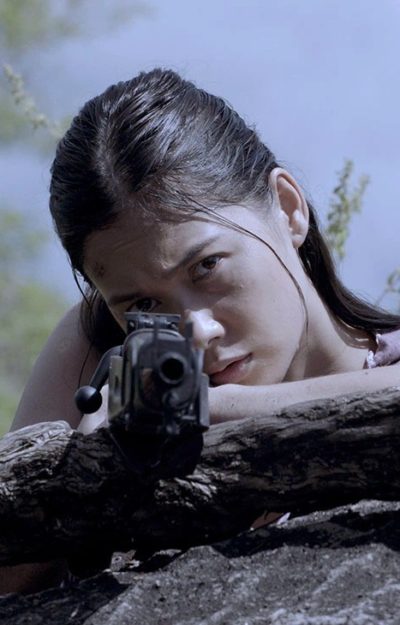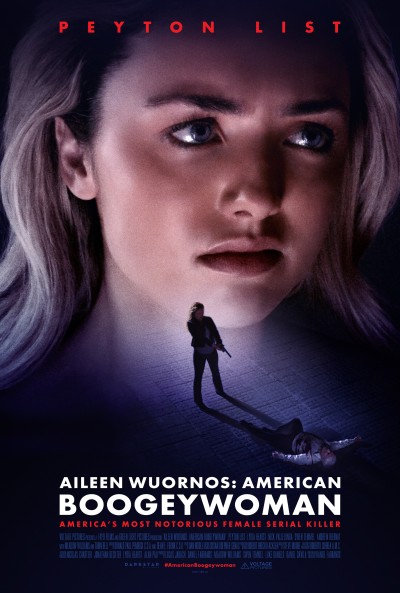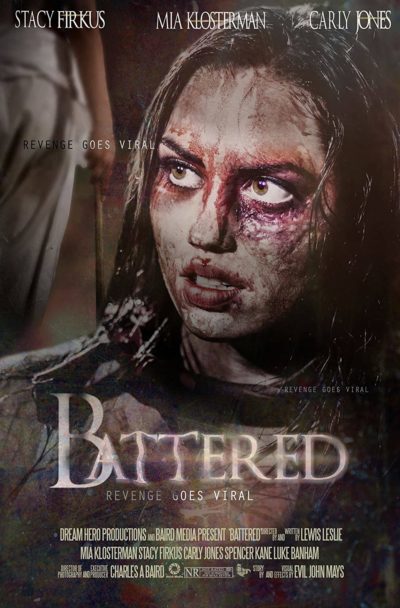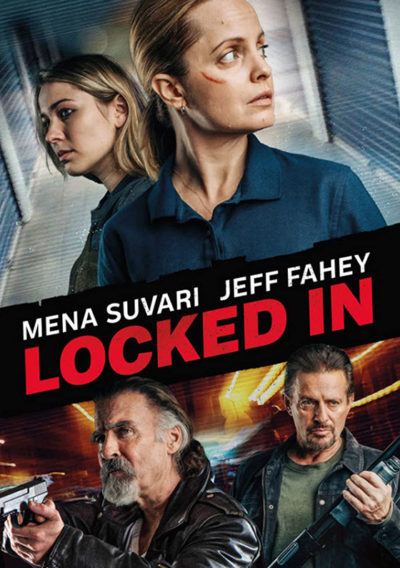★★★★
“The wilderness strikes back.”

 The heroine here, Mariano (Salvador), has to count as the baddest bitch I’ve seen in quite a long time. In terms of being a sheer, unstoppable force, she’s right up there with Jen from Revenge. There’s an absolute moral compass at play here, which combines a stoic refusal to harm the innocent, with utter ruthlessness when it comes to punishing the guilty. And she is judge, jury and especially executioner, when it comes to determining who’s who. Of particular note, most action heroines tend to kill only when directly threatened. Here however, once Mariano has decided you’re on the wrong side, death can come for you at any moment, without the need for any further provocation.
The heroine here, Mariano (Salvador), has to count as the baddest bitch I’ve seen in quite a long time. In terms of being a sheer, unstoppable force, she’s right up there with Jen from Revenge. There’s an absolute moral compass at play here, which combines a stoic refusal to harm the innocent, with utter ruthlessness when it comes to punishing the guilty. And she is judge, jury and especially executioner, when it comes to determining who’s who. Of particular note, most action heroines tend to kill only when directly threatened. Here however, once Mariano has decided you’re on the wrong side, death can come for you at any moment, without the need for any further provocation.
She is a Filipino police officer, part of a convoy taking the vice-mayor of a town to testify against a drug cartel. In particular, he’s going to name names of those in authority who are working with the cartel. Naturally, this can’t be allowed to happen, and it’s no surprise when the convoy is ambushed. Mariano is the sole survivor, and takes possession of the official’s cellphone, which contains the incriminating evidence. It’s not long before Sonny (Confiado), the cartel leader shows up, demonstrating a ruthless approach to the situation, and none too happy to discover he’s one short in the corpse department. He and his lackeys, including one of Mariano’s colleagues (Acuña), enter the jungle in pursuit of the wounded fugitive. She gets help from a young indigenous girl (Romualdo) and her family, but doing so exposes them to Sonny’s brutal wrath.
That’s when the gloves come off, thanks in part to Mariano being led to a stash of World War 2 weapons, left behind when local soldiers were trying to escape the Japanese. I’ll admit to raising an eyebrow at this. Would such weapons really be in perfect working order, after 75 years in a tropical jungle? Hey, I’m no expert. [Despite running this site, I haven’t even touched a gun since moving to Arizona in 2000!] With that as a given though, what follows is some remarkably splattery head-shots, as Mariano works her way through Sonny’s henchmen, and up to the inevitable confrontation with the man himself.
Interspersed in this are flashbacks to her back in the big city, being ordered to shoot someone entirely on the say-so of her boss, to prove her loyalty to her colleagues. That is about the extent of insight into Mariano’s character the film offers, but it’s enough to work, since actions here definitely speak louder than words. Indeed, the audience is likely better off than the heroine, getting subtitles for the native dialogue, a language which Mariano doesn’t speak. The intent is typically clear enough, even if a few scenes did leave me a little uncertain as to their purpose. Overall though, the result is an engrossing and always interesting watch, which doesn’t hold back, and takes no prisoners. Much like its central character.
Dir: Mikhail Red
Star: Maja Salvador, Shella Mae Romualdo, Mon Confiado, Arthur Acuña





 Over in my non-GWG life, I’ve been on
Over in my non-GWG life, I’ve been on  Almost twenty years after her execution, Aileen Wuornos remains a cultural icon. A very rare example of a genuine female serial killer, she was killed by lethal injection in 2002, after being convicted of six murders, and confessing to a seventh. The following year, Charlize Theron won an Oscar for her portrayal of Wuornos in
Almost twenty years after her execution, Aileen Wuornos remains a cultural icon. A very rare example of a genuine female serial killer, she was killed by lethal injection in 2002, after being convicted of six murders, and confessing to a seventh. The following year, Charlize Theron won an Oscar for her portrayal of Wuornos in  The above odd combination is actually a fairly accurate assessment of what you have here. It’s a Yakuza action-thriller… but rather than being set in Tokyo or Osaka, is relocated to the Brazillian city of Sao Paolo. As an introductory credit helpfully informs us, this has the largest Japanese population of any city outside Japan. The story concerns two separate people’s quests for their pasts, which (to absolutely no-one’s surprise) turn out to be intertwined. One of these is Akemi (MASUMI), who as a young child was the sole survivor of a 1999 massacre of her Yakuza family back in Japan, was subsequently spirited away by allies and is now living in Brazil. The other is Shiro (Rhys-Meyers), an amnesiac who wakes up in hospital with no clue as to how he got there or his identity, except for a Japanese sword.
The above odd combination is actually a fairly accurate assessment of what you have here. It’s a Yakuza action-thriller… but rather than being set in Tokyo or Osaka, is relocated to the Brazillian city of Sao Paolo. As an introductory credit helpfully informs us, this has the largest Japanese population of any city outside Japan. The story concerns two separate people’s quests for their pasts, which (to absolutely no-one’s surprise) turn out to be intertwined. One of these is Akemi (MASUMI), who as a young child was the sole survivor of a 1999 massacre of her Yakuza family back in Japan, was subsequently spirited away by allies and is now living in Brazil. The other is Shiro (Rhys-Meyers), an amnesiac who wakes up in hospital with no clue as to how he got there or his identity, except for a Japanese sword. As usual, I begin with the normal disclaimer, that I’m about as far from the target audience as you could imagine. For this is an inner-city story about a drug war between three rival gangs in South Carolina: the Guardians, the Dynasty and the GeeChees. That said, however, there have been other films, with not dissimilar themes, which I have enjoyed. Most obviously, I am not the target audience for Pam Grier’s seventies output either. But those still kick ass. Even among the modern entries, there have been ones like
As usual, I begin with the normal disclaimer, that I’m about as far from the target audience as you could imagine. For this is an inner-city story about a drug war between three rival gangs in South Carolina: the Guardians, the Dynasty and the GeeChees. That said, however, there have been other films, with not dissimilar themes, which I have enjoyed. Most obviously, I am not the target audience for Pam Grier’s seventies output either. But those still kick ass. Even among the modern entries, there have been ones like  My first surprise here was that this clocks in at a crisp 44 minutes. That’s an awkward length for any film: too short to be a feature, but most festivals that accept short films will balk at a submission of that length, when the time could instead be used to accept three x 15-minute entries [as someone who runs a festival, this is definitely a consideration]. Quite how this got distribution, I’m therefore not sure; but there it was, sitting on Amazon Prime. However, less than two minutes into the viewing experience, I found myself thanking my stars the running time was so brief. Because this is hamstrung by the worst audio I’ve seen on any film in several years. When even an envelope being opened sounds like a burst of automatic gunfire, you’ve got a problem, and there’s hardly a scene here where this aspect is not bad enough, as to be an unbearable distraction.
My first surprise here was that this clocks in at a crisp 44 minutes. That’s an awkward length for any film: too short to be a feature, but most festivals that accept short films will balk at a submission of that length, when the time could instead be used to accept three x 15-minute entries [as someone who runs a festival, this is definitely a consideration]. Quite how this got distribution, I’m therefore not sure; but there it was, sitting on Amazon Prime. However, less than two minutes into the viewing experience, I found myself thanking my stars the running time was so brief. Because this is hamstrung by the worst audio I’ve seen on any film in several years. When even an envelope being opened sounds like a burst of automatic gunfire, you’ve got a problem, and there’s hardly a scene here where this aspect is not bad enough, as to be an unbearable distraction. Yeah, the scale here is a bit smaller than the Spielberg classic, to put it mildly. As in… there’s precisely one (1) velociraptor. For reasons that are a bit unclear, this is roaming a deserted Wild West attraction on the road to Los Angeles. Heading to LA are wannabe stand-up comic Julia (Walker) and her flamingly gay best friend, Kyle (Rennie). An accident forces them off the road, and with – what a surprise! – no cell signal, they are forced to seek help at the previously mentioned attraction, where Ray (Mede) is the only inhabitant, and is acting a bit odd. Turns out, there’s good reason for this, with a large, carnivorous prehistoric reptile roaming the facility, the work of a mad scientist (Mertz). Will Julia
Yeah, the scale here is a bit smaller than the Spielberg classic, to put it mildly. As in… there’s precisely one (1) velociraptor. For reasons that are a bit unclear, this is roaming a deserted Wild West attraction on the road to Los Angeles. Heading to LA are wannabe stand-up comic Julia (Walker) and her flamingly gay best friend, Kyle (Rennie). An accident forces them off the road, and with – what a surprise! – no cell signal, they are forced to seek help at the previously mentioned attraction, where Ray (Mede) is the only inhabitant, and is acting a bit odd. Turns out, there’s good reason for this, with a large, carnivorous prehistoric reptile roaming the facility, the work of a mad scientist (Mertz). Will Julia  I will say, I did actually enjoy this rather more than the rating above indicates. For pure entertainment value, it’s a 3 to 3½-star entity, when watched as a brutal parody of new feminism. The problem is, I don’t think those involved with it were making a parody. As a serious statement about gender, it’s almost impossible to take seriously. Alexandra Nelson (Cotter) is at the end of her tether, when she gets a call that her long-estranged mother is dying. Driving home to pick up the body, she finds it being hustled out the back of the crematorium. Turns out to be part of an organ harvesting scheme, run by the local crime bosses. This gives Alex something to live for, and she begins a one-woman campaign to take down the perpetrators. But that’s a mission which will drag in her estranged sister, bikini barista Jenny (Gately), into peril as Alex’s targets respond to her actions.
I will say, I did actually enjoy this rather more than the rating above indicates. For pure entertainment value, it’s a 3 to 3½-star entity, when watched as a brutal parody of new feminism. The problem is, I don’t think those involved with it were making a parody. As a serious statement about gender, it’s almost impossible to take seriously. Alexandra Nelson (Cotter) is at the end of her tether, when she gets a call that her long-estranged mother is dying. Driving home to pick up the body, she finds it being hustled out the back of the crematorium. Turns out to be part of an organ harvesting scheme, run by the local crime bosses. This gives Alex something to live for, and she begins a one-woman campaign to take down the perpetrators. But that’s a mission which will drag in her estranged sister, bikini barista Jenny (Gately), into peril as Alex’s targets respond to her actions. There’s a decent idea here, and an attempt to add some new wrinkles to that old reliable, the rape-revenge genre. Unfortunately, there are too many problems and missteps to make this a worthwhile entry. Violet (Winkler) is an aspiring actress, whose dreams are shattered when she falls for a fake audition. She is lured into a basement, raped, and the resulting footage posted on a highly-dubious website. She’s clearly broken by the trauma, to the increasing worry of her mother (Burns). But hope is present in her growing relationship with Josh (Crowe), a young man she met at the lake where Violet likes to sit, trying to find some measure of peace. However, how will he react when he finds out about her other life, in which she is making those responsible for the assault, pay.
There’s a decent idea here, and an attempt to add some new wrinkles to that old reliable, the rape-revenge genre. Unfortunately, there are too many problems and missteps to make this a worthwhile entry. Violet (Winkler) is an aspiring actress, whose dreams are shattered when she falls for a fake audition. She is lured into a basement, raped, and the resulting footage posted on a highly-dubious website. She’s clearly broken by the trauma, to the increasing worry of her mother (Burns). But hope is present in her growing relationship with Josh (Crowe), a young man she met at the lake where Violet likes to sit, trying to find some measure of peace. However, how will he react when he finds out about her other life, in which she is making those responsible for the assault, pay. I am old enough to remember when Suvari was playing jailbait in American Beauty. It is therefore a bit disturbing to find her here, taking on the role of the mother of a seventeen-year-old daughter. Where has the time gone? But then, it has now been approaching 23 years since Beauty came out. This realization is probably more chilling than anything this technically competent, but almost entirely lacklustre thriller is able to deliver. It starts off with an interesting premise, and even has some not commonly-seen elements in its heroine. But the longer this goes on, the more it feels rote and by the numbers, without enough to differentiate it from other, better entries in the (more or less) Die Hard knock-off sub-genre.
I am old enough to remember when Suvari was playing jailbait in American Beauty. It is therefore a bit disturbing to find her here, taking on the role of the mother of a seventeen-year-old daughter. Where has the time gone? But then, it has now been approaching 23 years since Beauty came out. This realization is probably more chilling than anything this technically competent, but almost entirely lacklustre thriller is able to deliver. It starts off with an interesting premise, and even has some not commonly-seen elements in its heroine. But the longer this goes on, the more it feels rote and by the numbers, without enough to differentiate it from other, better entries in the (more or less) Die Hard knock-off sub-genre.